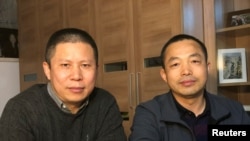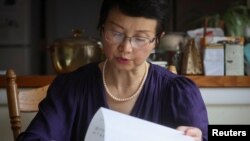Christmas hasn’t been an easy time for Luo Shengchun. Instead of celebrating the holiday season with family in China, the wife of prominent Chinese human rights lawyer Ding Jiaxi has spent the last four years advocating for her detained husband and other Chinese dissidents.
“Christmas has become a challenging holiday for me since 2019 after Chinese police arrested my husband in a crackdown targeting dissidents who participated in a private gathering,” Luo, who now lives in the U.S., told VOA by phone.
“I’m usually not in the mood to buy Christmas greeting cards and I usually try to bury myself in work, which is a way for me to try to relax my mind a bit,” she added.
Luo’s husband Ding and Chinese dissident Xu Zhiyong were leading figures in the New Citizens’ Movement, a group of activists and lawyers concerned about human rights and government transparency in China.
After taking part in a private gathering in the Chinese city of Xiamen in December 2019, during which they discussed human rights and China’s future with more than 20 Chinese dissidents, Ding, Xu, and Xu’s girlfriend, Li Qiaochu, were arrested by the police in the following months. In April 2023, Ding and Xu were sentenced to more than 10 years in prison for subversion of state power, while Li’s secret trial was suspended by the court earlier this month.
Before their sentencing in April, Xu and Ding had been detained for more than three years. During that time, they were denied meetings with their lawyers, tortured, and kept under residential surveillance at a designated location, a form of solitary detention often used by Chinese authorities against individuals accused of endangering national security.
Despite Ding and Xu’s attempts to appeal the initial court ruling last month, the Shandong Provincial High Court upheld its decision. Ding’s wife Luo accused the authorities of withholding the verdict from family members.
“The way that the Chinese authorities handle the case shows that they have no regard for the law and are behaving like ‘mafia,’ trying to dictate the entire judicial process,” she told VOA.
Some analysts say the Chinese government’s handling of the cases shows the rule of law no longer exists in China and that Beijing is trying to prevent the public from paying attention to the cases by delaying the judicial process.
“The Chinese government doesn’t want people to remember these cases, and they want to bury the cases through secret trials and imposing lengthy prison sentences against the activists,” Patrick Poon, a visiting researcher at the University of Tokyo, told VOA by phone.
Becoming “accidental human rights defenders”
Despite the Chinese government’s efforts to reduce public attention on sensitive human rights cases, the wives of detained Chinese dissidents have been advocating for their husbands around the world, hoping to raise awareness about human rights abuses in China.
“The best way to get the international community’s attention on these human rights cases in China is to speak about them from a family member’s perspective,” Luo told VOA.
“I always start with the stories of Ding Jiaxi and Xu Zhiyong, then I touch on the current situation of human rights violation in China, the re-arrest of human rights lawyer Yu Wensheng and his wife Xu Yan in April, and the exit bans that the Chinese authorities have imposed on human rights lawyers,” she added.
Despite her full-time job as an engineer, Luo has testified before the U.S. Congress and spoken about the persecution of Chinese dissidents at events and award ceremonies around the world.
In her view, these efforts allow her to become part of the global community that tries to counter China’s authoritarian rule. “The Xiamen gathering has led me to this path,” Luo said.
Other Chinese dissidents’ wives say the experience of becoming “accidental human rights defenders” has helped them understand a side of China they didn’t know about.
“This experience has completely changed the trajectory of my life, essentially wiping out all the achievements that I’ve made in China over the last 30 years,” Chen Zijuan, the wife of detained Chinese human rights lawyer Chang Wei-ping, told VOA by phone.
Chen went into self-imposed exile with her son in the U.S. last year after experiencing repeated threats and harassment from local authorities for advocating for her husband’s release. “I don’t regret making this decision because the experience of becoming an activist helps me realize what China is really like,” she said.
“I used to not know about the Chinese government’s persecution of the human rights lawyers during the 709 Mass Arrest in 2015 and the Tiananmen Square Massacre,” Chen said. “Since I started to advocate for my husband, I’m no longer blinded by Beijing’s brainwashing,” Chen said.
While she hopes other Chinese dissidents’ wives can join her in advocating for people facing persecution in China, Luo vows to keep speaking up for all “prisoners of conscience” in China.
“All of my friends support my efforts because this is an important step to ensure all prisoners of conscience in China won’t die in detention,” she told VOA. “I hope to see all of them walk out of the prison alive.”





